Leadership Styles and Their Impact
VerifiedAdded on 2020/06/06
|15
|4601
|80
AI Summary
The assignment delves into different leadership styles, examining their influence on employee motivation, conflict resolution strategies, and overall organizational commitment. It requires a review of academic literature and research findings on various leadership theories, such as transformational, transactional, and shared leadership. The analysis should highlight the connections between specific leadership styles and outcomes in diverse organizational contexts.
Contribute Materials
Your contribution can guide someone’s learning journey. Share your
documents today.
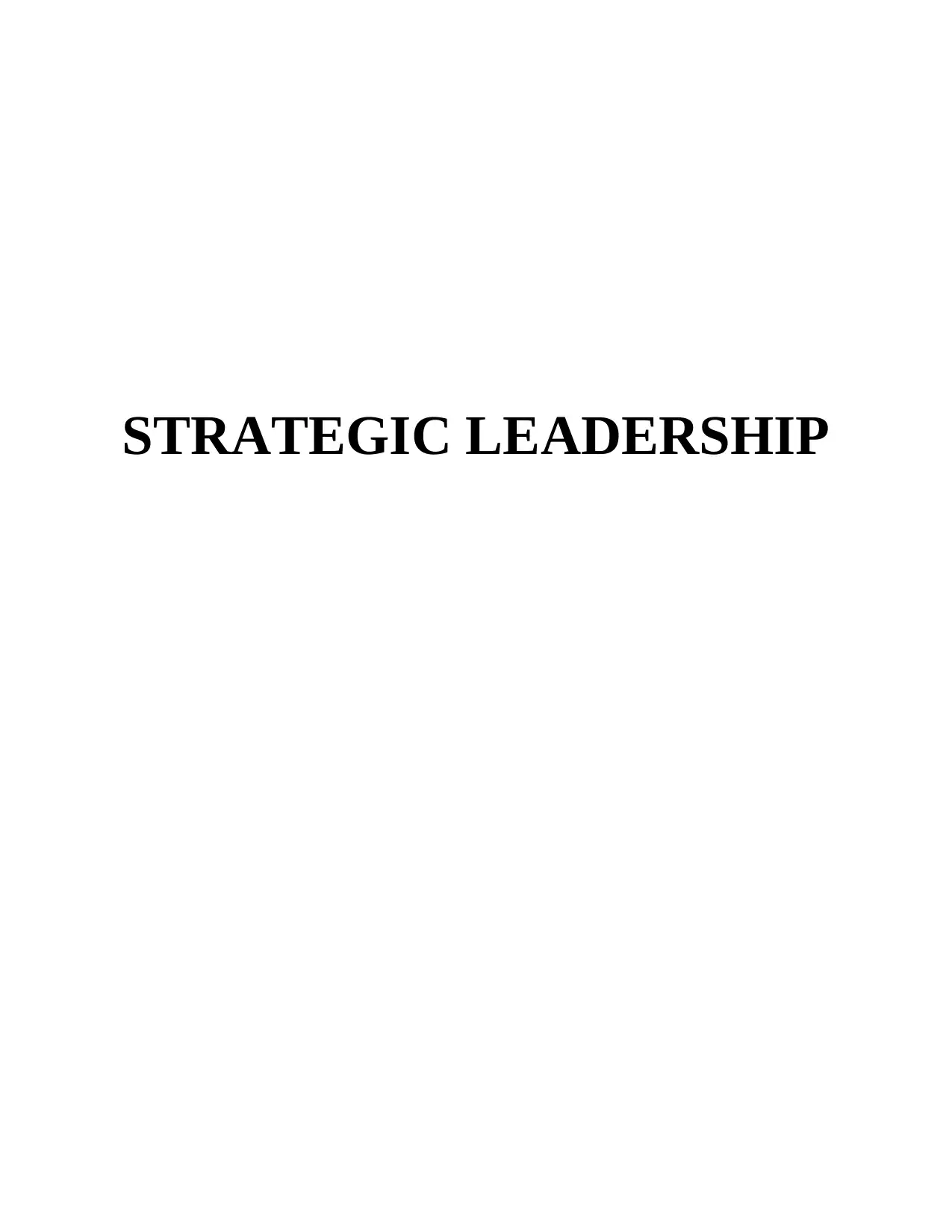
STRATEGIC LEADERSHIP
Secure Best Marks with AI Grader
Need help grading? Try our AI Grader for instant feedback on your assignments.
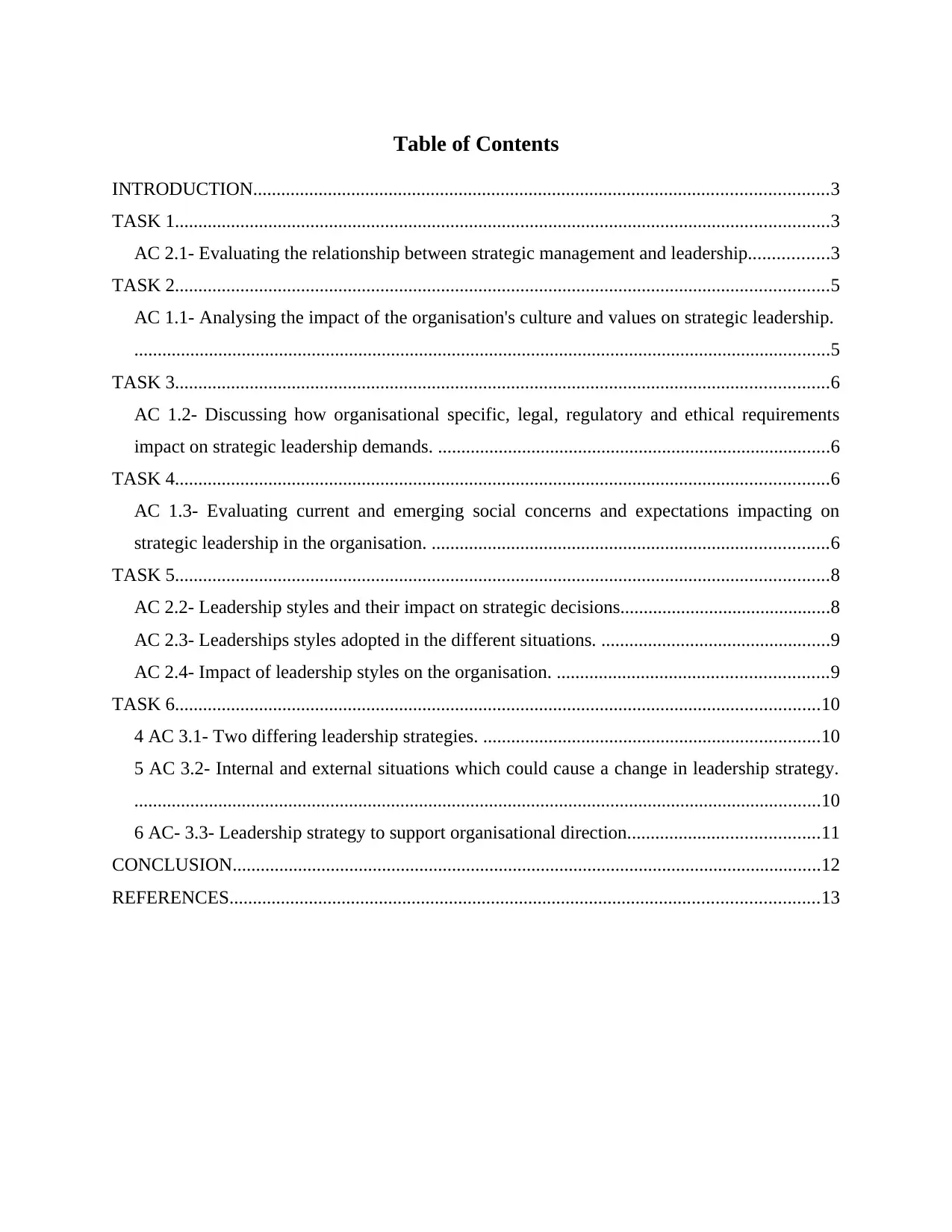
Table of Contents
INTRODUCTION...........................................................................................................................3
TASK 1............................................................................................................................................3
AC 2.1- Evaluating the relationship between strategic management and leadership.................3
TASK 2............................................................................................................................................5
AC 1.1- Analysing the impact of the organisation's culture and values on strategic leadership.
.....................................................................................................................................................5
TASK 3............................................................................................................................................6
AC 1.2- Discussing how organisational specific, legal, regulatory and ethical requirements
impact on strategic leadership demands. ....................................................................................6
TASK 4............................................................................................................................................6
AC 1.3- Evaluating current and emerging social concerns and expectations impacting on
strategic leadership in the organisation. .....................................................................................6
TASK 5............................................................................................................................................8
AC 2.2- Leadership styles and their impact on strategic decisions.............................................8
AC 2.3- Leaderships styles adopted in the different situations. .................................................9
AC 2.4- Impact of leadership styles on the organisation. ..........................................................9
TASK 6..........................................................................................................................................10
4 AC 3.1- Two differing leadership strategies. ........................................................................10
5 AC 3.2- Internal and external situations which could cause a change in leadership strategy.
...................................................................................................................................................10
6 AC- 3.3- Leadership strategy to support organisational direction.........................................11
CONCLUSION..............................................................................................................................12
REFERENCES..............................................................................................................................13
INTRODUCTION...........................................................................................................................3
TASK 1............................................................................................................................................3
AC 2.1- Evaluating the relationship between strategic management and leadership.................3
TASK 2............................................................................................................................................5
AC 1.1- Analysing the impact of the organisation's culture and values on strategic leadership.
.....................................................................................................................................................5
TASK 3............................................................................................................................................6
AC 1.2- Discussing how organisational specific, legal, regulatory and ethical requirements
impact on strategic leadership demands. ....................................................................................6
TASK 4............................................................................................................................................6
AC 1.3- Evaluating current and emerging social concerns and expectations impacting on
strategic leadership in the organisation. .....................................................................................6
TASK 5............................................................................................................................................8
AC 2.2- Leadership styles and their impact on strategic decisions.............................................8
AC 2.3- Leaderships styles adopted in the different situations. .................................................9
AC 2.4- Impact of leadership styles on the organisation. ..........................................................9
TASK 6..........................................................................................................................................10
4 AC 3.1- Two differing leadership strategies. ........................................................................10
5 AC 3.2- Internal and external situations which could cause a change in leadership strategy.
...................................................................................................................................................10
6 AC- 3.3- Leadership strategy to support organisational direction.........................................11
CONCLUSION..............................................................................................................................12
REFERENCES..............................................................................................................................13
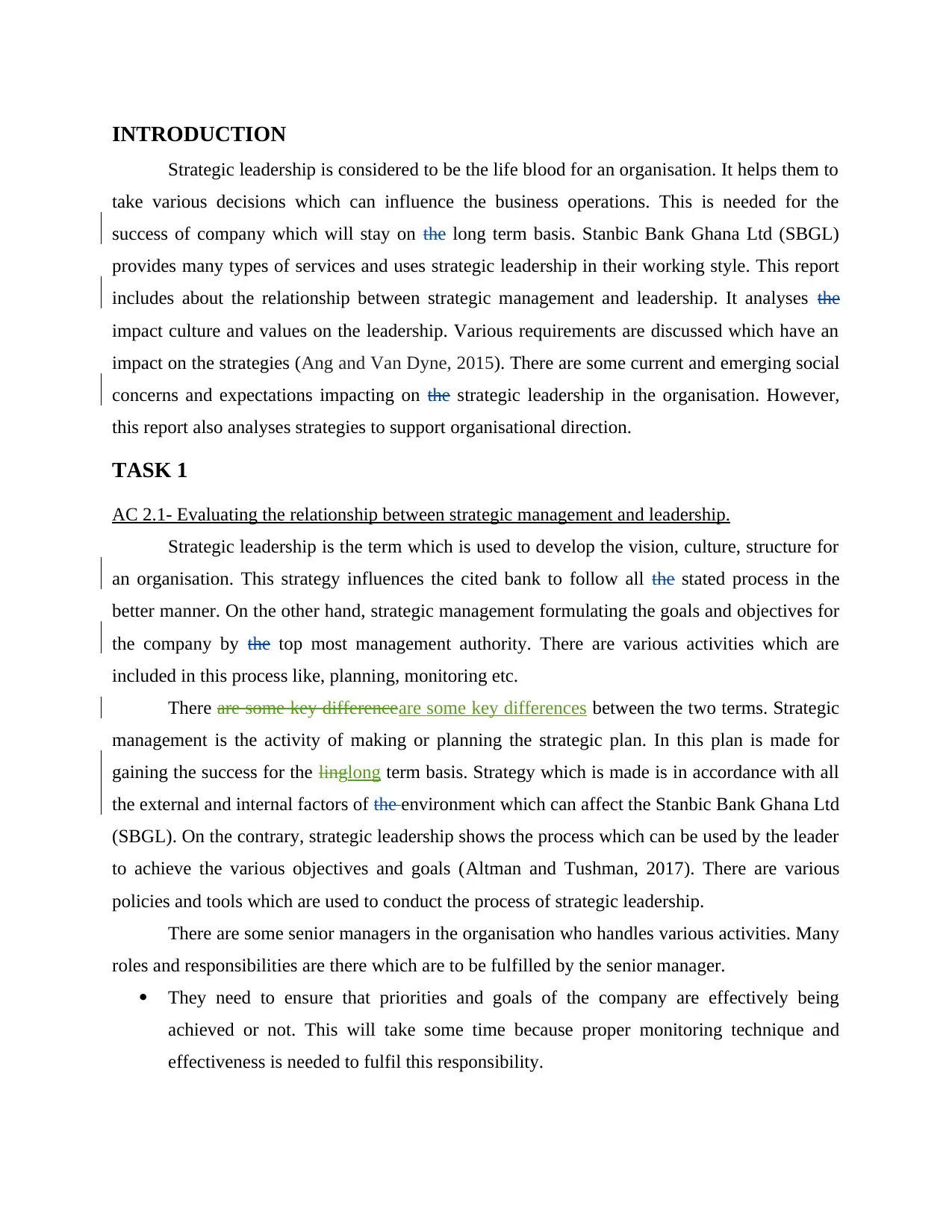
INTRODUCTION
Strategic leadership is considered to be the life blood for an organisation. It helps them to
take various decisions which can influence the business operations. This is needed for the
success of company which will stay on the long term basis. Stanbic Bank Ghana Ltd (SBGL)
provides many types of services and uses strategic leadership in their working style. This report
includes about the relationship between strategic management and leadership. It analyses the
impact culture and values on the leadership. Various requirements are discussed which have an
impact on the strategies (Ang and Van Dyne, 2015). There are some current and emerging social
concerns and expectations impacting on the strategic leadership in the organisation. However,
this report also analyses strategies to support organisational direction.
TASK 1
AC 2.1- Evaluating the relationship between strategic management and leadership.
Strategic leadership is the term which is used to develop the vision, culture, structure for
an organisation. This strategy influences the cited bank to follow all the stated process in the
better manner. On the other hand, strategic management formulating the goals and objectives for
the company by the top most management authority. There are various activities which are
included in this process like, planning, monitoring etc.
There are some key differenceare some key differences between the two terms. Strategic
management is the activity of making or planning the strategic plan. In this plan is made for
gaining the success for the linglong term basis. Strategy which is made is in accordance with all
the external and internal factors of the environment which can affect the Stanbic Bank Ghana Ltd
(SBGL). On the contrary, strategic leadership shows the process which can be used by the leader
to achieve the various objectives and goals (Altman and Tushman, 2017). There are various
policies and tools which are used to conduct the process of strategic leadership.
There are some senior managers in the organisation who handles various activities. Many
roles and responsibilities are there which are to be fulfilled by the senior manager.
They need to ensure that priorities and goals of the company are effectively being
achieved or not. This will take some time because proper monitoring technique and
effectiveness is needed to fulfil this responsibility.
Strategic leadership is considered to be the life blood for an organisation. It helps them to
take various decisions which can influence the business operations. This is needed for the
success of company which will stay on the long term basis. Stanbic Bank Ghana Ltd (SBGL)
provides many types of services and uses strategic leadership in their working style. This report
includes about the relationship between strategic management and leadership. It analyses the
impact culture and values on the leadership. Various requirements are discussed which have an
impact on the strategies (Ang and Van Dyne, 2015). There are some current and emerging social
concerns and expectations impacting on the strategic leadership in the organisation. However,
this report also analyses strategies to support organisational direction.
TASK 1
AC 2.1- Evaluating the relationship between strategic management and leadership.
Strategic leadership is the term which is used to develop the vision, culture, structure for
an organisation. This strategy influences the cited bank to follow all the stated process in the
better manner. On the other hand, strategic management formulating the goals and objectives for
the company by the top most management authority. There are various activities which are
included in this process like, planning, monitoring etc.
There are some key differenceare some key differences between the two terms. Strategic
management is the activity of making or planning the strategic plan. In this plan is made for
gaining the success for the linglong term basis. Strategy which is made is in accordance with all
the external and internal factors of the environment which can affect the Stanbic Bank Ghana Ltd
(SBGL). On the contrary, strategic leadership shows the process which can be used by the leader
to achieve the various objectives and goals (Altman and Tushman, 2017). There are various
policies and tools which are used to conduct the process of strategic leadership.
There are some senior managers in the organisation who handles various activities. Many
roles and responsibilities are there which are to be fulfilled by the senior manager.
They need to ensure that priorities and goals of the company are effectively being
achieved or not. This will take some time because proper monitoring technique and
effectiveness is needed to fulfil this responsibility.
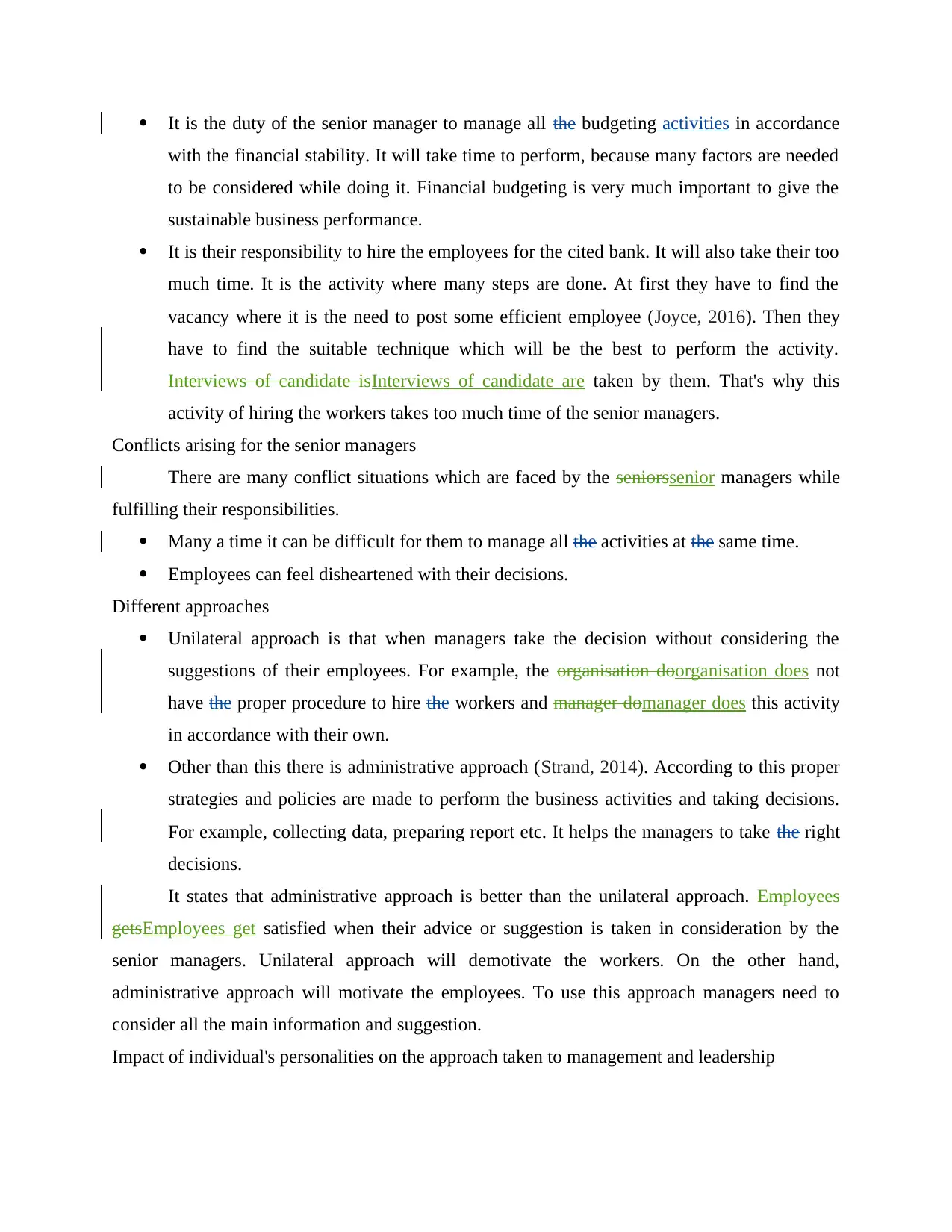
It is the duty of the senior manager to manage all the budgeting activities in accordance
with the financial stability. It will take time to perform, because many factors are needed
to be considered while doing it. Financial budgeting is very much important to give the
sustainable business performance.
It is their responsibility to hire the employees for the cited bank. It will also take their too
much time. It is the activity where many steps are done. At first they have to find the
vacancy where it is the need to post some efficient employee (Joyce, 2016). Then they
have to find the suitable technique which will be the best to perform the activity.
Interviews of candidate isInterviews of candidate are taken by them. That's why this
activity of hiring the workers takes too much time of the senior managers.
Conflicts arising for the senior managers
There are many conflict situations which are faced by the seniorssenior managers while
fulfilling their responsibilities.
Many a time it can be difficult for them to manage all the activities at the same time.
Employees can feel disheartened with their decisions.
Different approaches
Unilateral approach is that when managers take the decision without considering the
suggestions of their employees. For example, the organisation doorganisation does not
have the proper procedure to hire the workers and manager domanager does this activity
in accordance with their own.
Other than this there is administrative approach (Strand, 2014). According to this proper
strategies and policies are made to perform the business activities and taking decisions.
For example, collecting data, preparing report etc. It helps the managers to take the right
decisions.
It states that administrative approach is better than the unilateral approach. Employees
getsEmployees get satisfied when their advice or suggestion is taken in consideration by the
senior managers. Unilateral approach will demotivate the workers. On the other hand,
administrative approach will motivate the employees. To use this approach managers need to
consider all the main information and suggestion.
Impact of individual's personalities on the approach taken to management and leadership
with the financial stability. It will take time to perform, because many factors are needed
to be considered while doing it. Financial budgeting is very much important to give the
sustainable business performance.
It is their responsibility to hire the employees for the cited bank. It will also take their too
much time. It is the activity where many steps are done. At first they have to find the
vacancy where it is the need to post some efficient employee (Joyce, 2016). Then they
have to find the suitable technique which will be the best to perform the activity.
Interviews of candidate isInterviews of candidate are taken by them. That's why this
activity of hiring the workers takes too much time of the senior managers.
Conflicts arising for the senior managers
There are many conflict situations which are faced by the seniorssenior managers while
fulfilling their responsibilities.
Many a time it can be difficult for them to manage all the activities at the same time.
Employees can feel disheartened with their decisions.
Different approaches
Unilateral approach is that when managers take the decision without considering the
suggestions of their employees. For example, the organisation doorganisation does not
have the proper procedure to hire the workers and manager domanager does this activity
in accordance with their own.
Other than this there is administrative approach (Strand, 2014). According to this proper
strategies and policies are made to perform the business activities and taking decisions.
For example, collecting data, preparing report etc. It helps the managers to take the right
decisions.
It states that administrative approach is better than the unilateral approach. Employees
getsEmployees get satisfied when their advice or suggestion is taken in consideration by the
senior managers. Unilateral approach will demotivate the workers. On the other hand,
administrative approach will motivate the employees. To use this approach managers need to
consider all the main information and suggestion.
Impact of individual's personalities on the approach taken to management and leadership
Secure Best Marks with AI Grader
Need help grading? Try our AI Grader for instant feedback on your assignments.
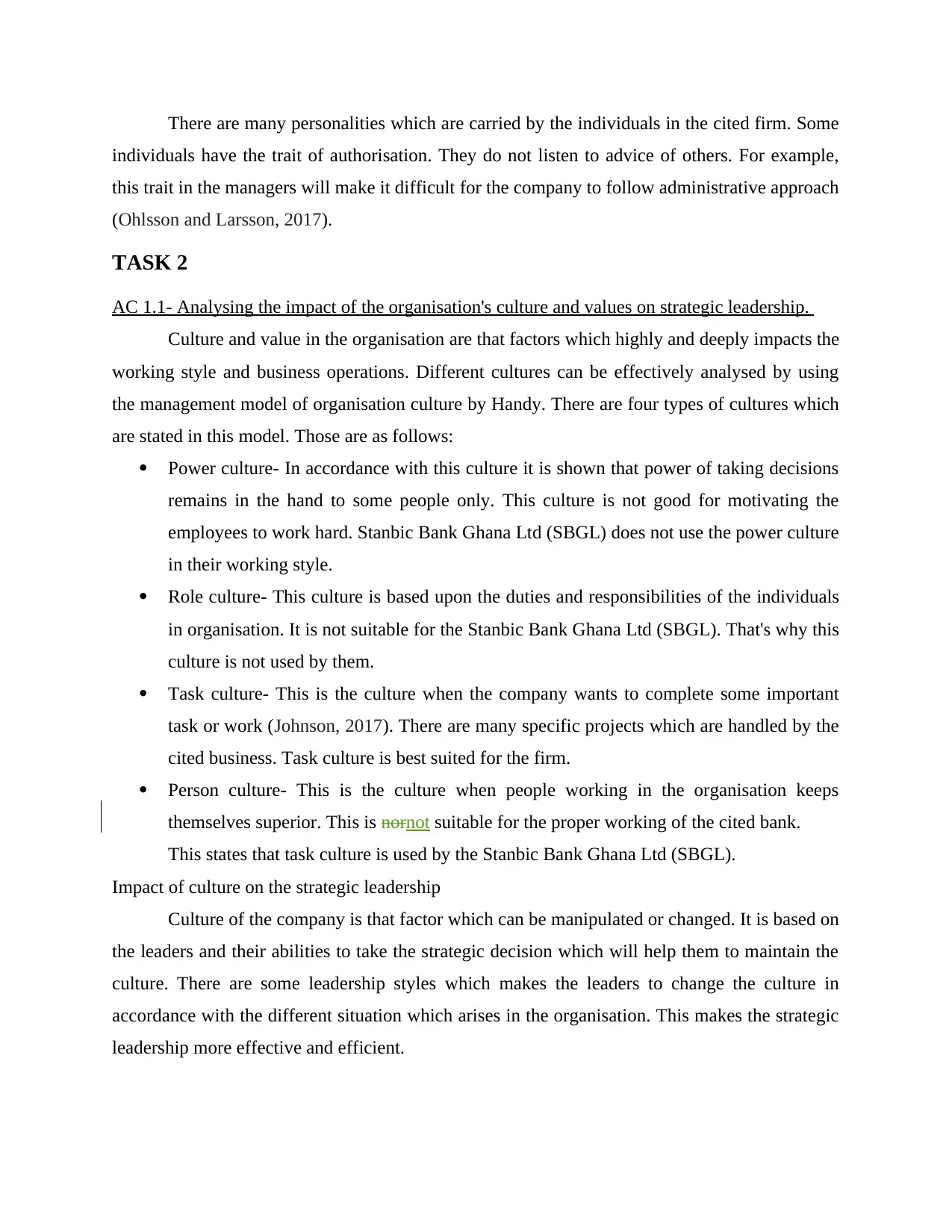
There are many personalities which are carried by the individuals in the cited firm. Some
individuals have the trait of authorisation. They do not listen to advice of others. For example,
this trait in the managers will make it difficult for the company to follow administrative approach
(Ohlsson and Larsson, 2017).
TASK 2
AC 1.1- Analysing the impact of the organisation's culture and values on strategic leadership.
Culture and value in the organisation are that factors which highly and deeply impacts the
working style and business operations. Different cultures can be effectively analysed by using
the management model of organisation culture by Handy. There are four types of cultures which
are stated in this model. Those are as follows:
Power culture- In accordance with this culture it is shown that power of taking decisions
remains in the hand to some people only. This culture is not good for motivating the
employees to work hard. Stanbic Bank Ghana Ltd (SBGL) does not use the power culture
in their working style.
Role culture- This culture is based upon the duties and responsibilities of the individuals
in organisation. It is not suitable for the Stanbic Bank Ghana Ltd (SBGL). That's why this
culture is not used by them.
Task culture- This is the culture when the company wants to complete some important
task or work (Johnson, 2017). There are many specific projects which are handled by the
cited business. Task culture is best suited for the firm.
Person culture- This is the culture when people working in the organisation keeps
themselves superior. This is nornot suitable for the proper working of the cited bank.
This states that task culture is used by the Stanbic Bank Ghana Ltd (SBGL).
Impact of culture on the strategic leadership
Culture of the company is that factor which can be manipulated or changed. It is based on
the leaders and their abilities to take the strategic decision which will help them to maintain the
culture. There are some leadership styles which makes the leaders to change the culture in
accordance with the different situation which arises in the organisation. This makes the strategic
leadership more effective and efficient.
individuals have the trait of authorisation. They do not listen to advice of others. For example,
this trait in the managers will make it difficult for the company to follow administrative approach
(Ohlsson and Larsson, 2017).
TASK 2
AC 1.1- Analysing the impact of the organisation's culture and values on strategic leadership.
Culture and value in the organisation are that factors which highly and deeply impacts the
working style and business operations. Different cultures can be effectively analysed by using
the management model of organisation culture by Handy. There are four types of cultures which
are stated in this model. Those are as follows:
Power culture- In accordance with this culture it is shown that power of taking decisions
remains in the hand to some people only. This culture is not good for motivating the
employees to work hard. Stanbic Bank Ghana Ltd (SBGL) does not use the power culture
in their working style.
Role culture- This culture is based upon the duties and responsibilities of the individuals
in organisation. It is not suitable for the Stanbic Bank Ghana Ltd (SBGL). That's why this
culture is not used by them.
Task culture- This is the culture when the company wants to complete some important
task or work (Johnson, 2017). There are many specific projects which are handled by the
cited business. Task culture is best suited for the firm.
Person culture- This is the culture when people working in the organisation keeps
themselves superior. This is nornot suitable for the proper working of the cited bank.
This states that task culture is used by the Stanbic Bank Ghana Ltd (SBGL).
Impact of culture on the strategic leadership
Culture of the company is that factor which can be manipulated or changed. It is based on
the leaders and their abilities to take the strategic decision which will help them to maintain the
culture. There are some leadership styles which makes the leaders to change the culture in
accordance with the different situation which arises in the organisation. This makes the strategic
leadership more effective and efficient.
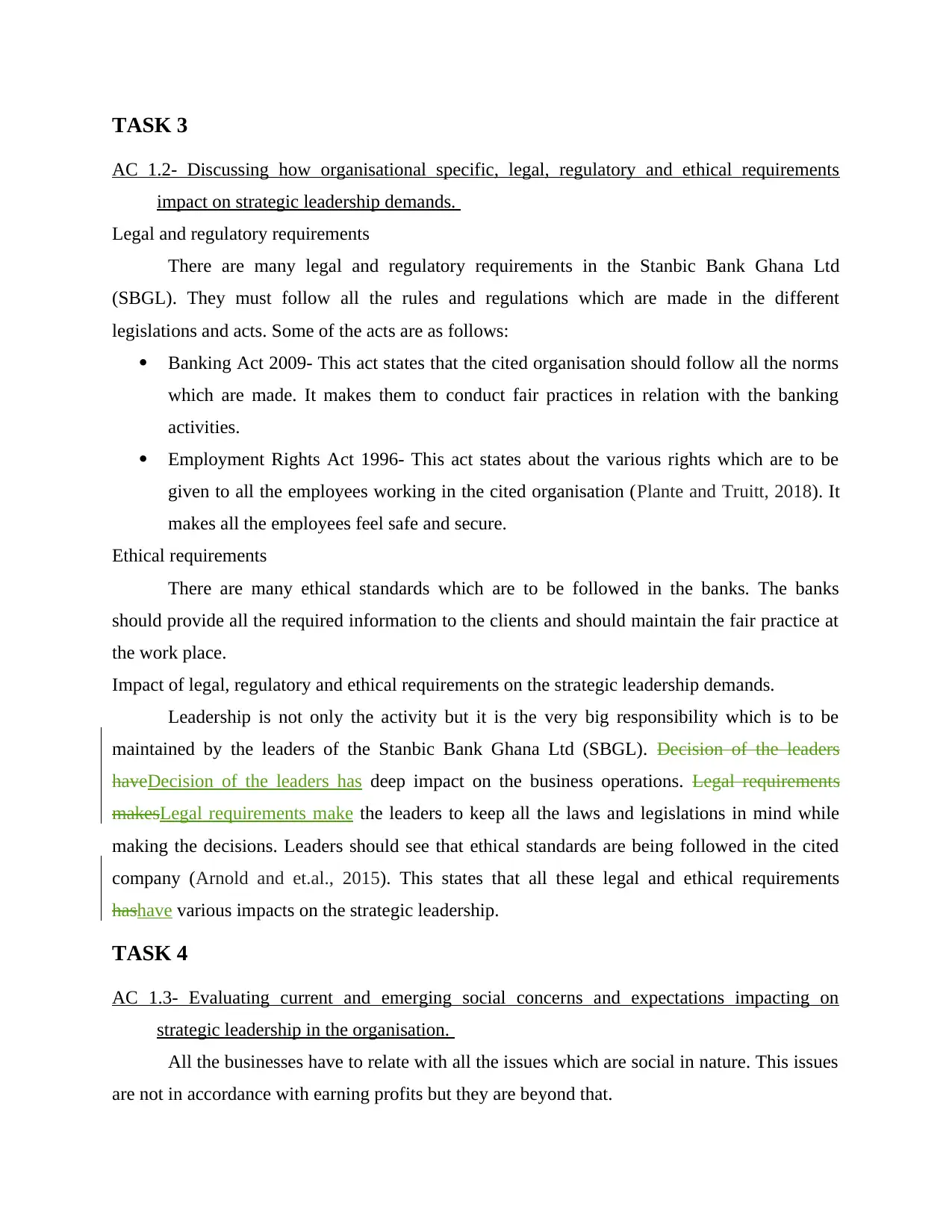
TASK 3
AC 1.2- Discussing how organisational specific, legal, regulatory and ethical requirements
impact on strategic leadership demands.
Legal and regulatory requirements
There are many legal and regulatory requirements in the Stanbic Bank Ghana Ltd
(SBGL). They must follow all the rules and regulations which are made in the different
legislations and acts. Some of the acts are as follows:
Banking Act 2009- This act states that the cited organisation should follow all the norms
which are made. It makes them to conduct fair practices in relation with the banking
activities.
Employment Rights Act 1996- This act states about the various rights which are to be
given to all the employees working in the cited organisation (Plante and Truitt, 2018). It
makes all the employees feel safe and secure.
Ethical requirements
There are many ethical standards which are to be followed in the banks. The banks
should provide all the required information to the clients and should maintain the fair practice at
the work place.
Impact of legal, regulatory and ethical requirements on the strategic leadership demands.
Leadership is not only the activity but it is the very big responsibility which is to be
maintained by the leaders of the Stanbic Bank Ghana Ltd (SBGL). Decision of the leaders
haveDecision of the leaders has deep impact on the business operations. Legal requirements
makesLegal requirements make the leaders to keep all the laws and legislations in mind while
making the decisions. Leaders should see that ethical standards are being followed in the cited
company (Arnold and et.al., 2015). This states that all these legal and ethical requirements
hashave various impacts on the strategic leadership.
TASK 4
AC 1.3- Evaluating current and emerging social concerns and expectations impacting on
strategic leadership in the organisation.
All the businesses have to relate with all the issues which are social in nature. This issues
are not in accordance with earning profits but they are beyond that.
AC 1.2- Discussing how organisational specific, legal, regulatory and ethical requirements
impact on strategic leadership demands.
Legal and regulatory requirements
There are many legal and regulatory requirements in the Stanbic Bank Ghana Ltd
(SBGL). They must follow all the rules and regulations which are made in the different
legislations and acts. Some of the acts are as follows:
Banking Act 2009- This act states that the cited organisation should follow all the norms
which are made. It makes them to conduct fair practices in relation with the banking
activities.
Employment Rights Act 1996- This act states about the various rights which are to be
given to all the employees working in the cited organisation (Plante and Truitt, 2018). It
makes all the employees feel safe and secure.
Ethical requirements
There are many ethical standards which are to be followed in the banks. The banks
should provide all the required information to the clients and should maintain the fair practice at
the work place.
Impact of legal, regulatory and ethical requirements on the strategic leadership demands.
Leadership is not only the activity but it is the very big responsibility which is to be
maintained by the leaders of the Stanbic Bank Ghana Ltd (SBGL). Decision of the leaders
haveDecision of the leaders has deep impact on the business operations. Legal requirements
makesLegal requirements make the leaders to keep all the laws and legislations in mind while
making the decisions. Leaders should see that ethical standards are being followed in the cited
company (Arnold and et.al., 2015). This states that all these legal and ethical requirements
hashave various impacts on the strategic leadership.
TASK 4
AC 1.3- Evaluating current and emerging social concerns and expectations impacting on
strategic leadership in the organisation.
All the businesses have to relate with all the issues which are social in nature. This issues
are not in accordance with earning profits but they are beyond that.
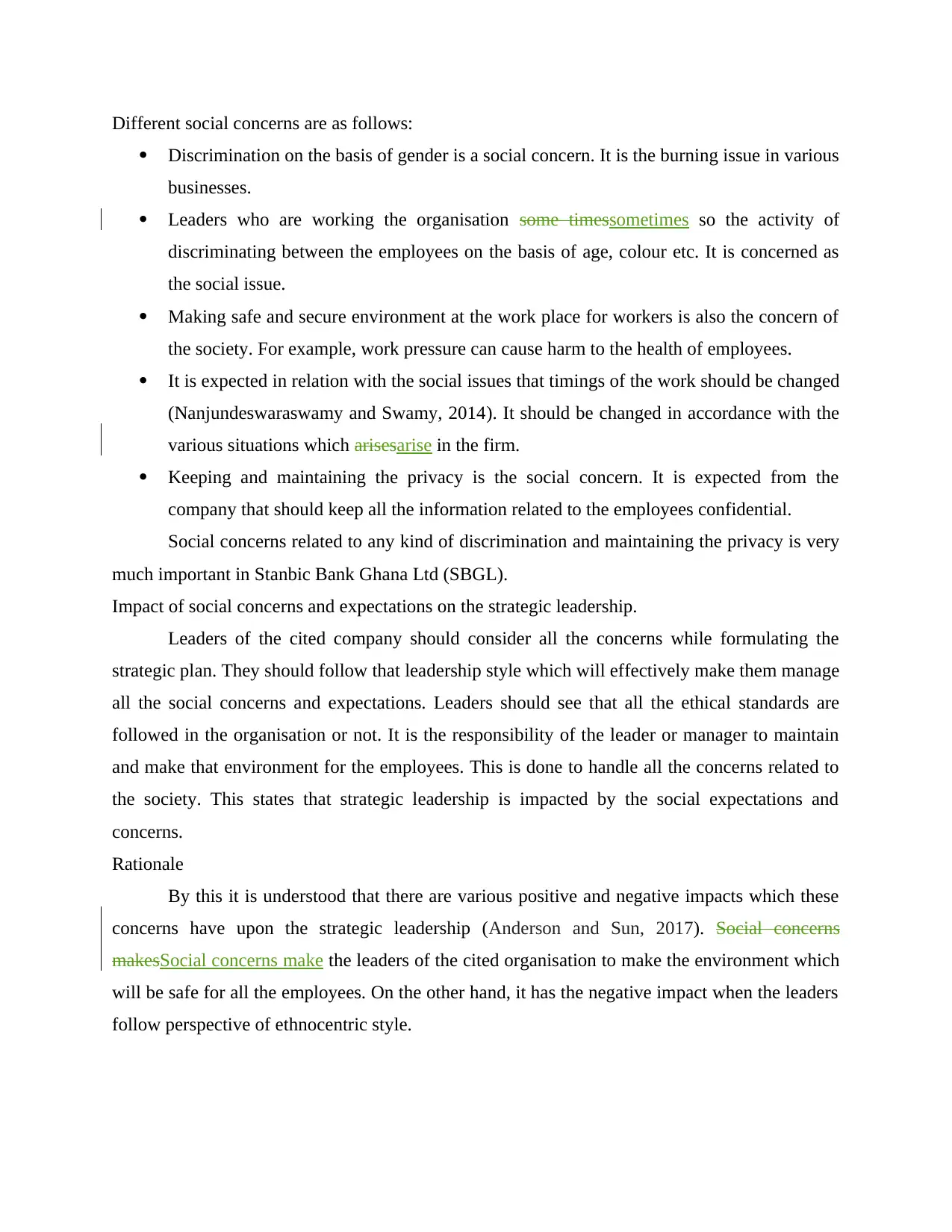
Different social concerns are as follows:
Discrimination on the basis of gender is a social concern. It is the burning issue in various
businesses.
Leaders who are working the organisation some timessometimes so the activity of
discriminating between the employees on the basis of age, colour etc. It is concerned as
the social issue.
Making safe and secure environment at the work place for workers is also the concern of
the society. For example, work pressure can cause harm to the health of employees.
It is expected in relation with the social issues that timings of the work should be changed
(Nanjundeswaraswamy and Swamy, 2014). It should be changed in accordance with the
various situations which arisesarise in the firm.
Keeping and maintaining the privacy is the social concern. It is expected from the
company that should keep all the information related to the employees confidential.
Social concerns related to any kind of discrimination and maintaining the privacy is very
much important in Stanbic Bank Ghana Ltd (SBGL).
Impact of social concerns and expectations on the strategic leadership.
Leaders of the cited company should consider all the concerns while formulating the
strategic plan. They should follow that leadership style which will effectively make them manage
all the social concerns and expectations. Leaders should see that all the ethical standards are
followed in the organisation or not. It is the responsibility of the leader or manager to maintain
and make that environment for the employees. This is done to handle all the concerns related to
the society. This states that strategic leadership is impacted by the social expectations and
concerns.
Rationale
By this it is understood that there are various positive and negative impacts which these
concerns have upon the strategic leadership (Anderson and Sun, 2017). Social concerns
makesSocial concerns make the leaders of the cited organisation to make the environment which
will be safe for all the employees. On the other hand, it has the negative impact when the leaders
follow perspective of ethnocentric style.
Discrimination on the basis of gender is a social concern. It is the burning issue in various
businesses.
Leaders who are working the organisation some timessometimes so the activity of
discriminating between the employees on the basis of age, colour etc. It is concerned as
the social issue.
Making safe and secure environment at the work place for workers is also the concern of
the society. For example, work pressure can cause harm to the health of employees.
It is expected in relation with the social issues that timings of the work should be changed
(Nanjundeswaraswamy and Swamy, 2014). It should be changed in accordance with the
various situations which arisesarise in the firm.
Keeping and maintaining the privacy is the social concern. It is expected from the
company that should keep all the information related to the employees confidential.
Social concerns related to any kind of discrimination and maintaining the privacy is very
much important in Stanbic Bank Ghana Ltd (SBGL).
Impact of social concerns and expectations on the strategic leadership.
Leaders of the cited company should consider all the concerns while formulating the
strategic plan. They should follow that leadership style which will effectively make them manage
all the social concerns and expectations. Leaders should see that all the ethical standards are
followed in the organisation or not. It is the responsibility of the leader or manager to maintain
and make that environment for the employees. This is done to handle all the concerns related to
the society. This states that strategic leadership is impacted by the social expectations and
concerns.
Rationale
By this it is understood that there are various positive and negative impacts which these
concerns have upon the strategic leadership (Anderson and Sun, 2017). Social concerns
makesSocial concerns make the leaders of the cited organisation to make the environment which
will be safe for all the employees. On the other hand, it has the negative impact when the leaders
follow perspective of ethnocentric style.
Paraphrase This Document
Need a fresh take? Get an instant paraphrase of this document with our AI Paraphraser
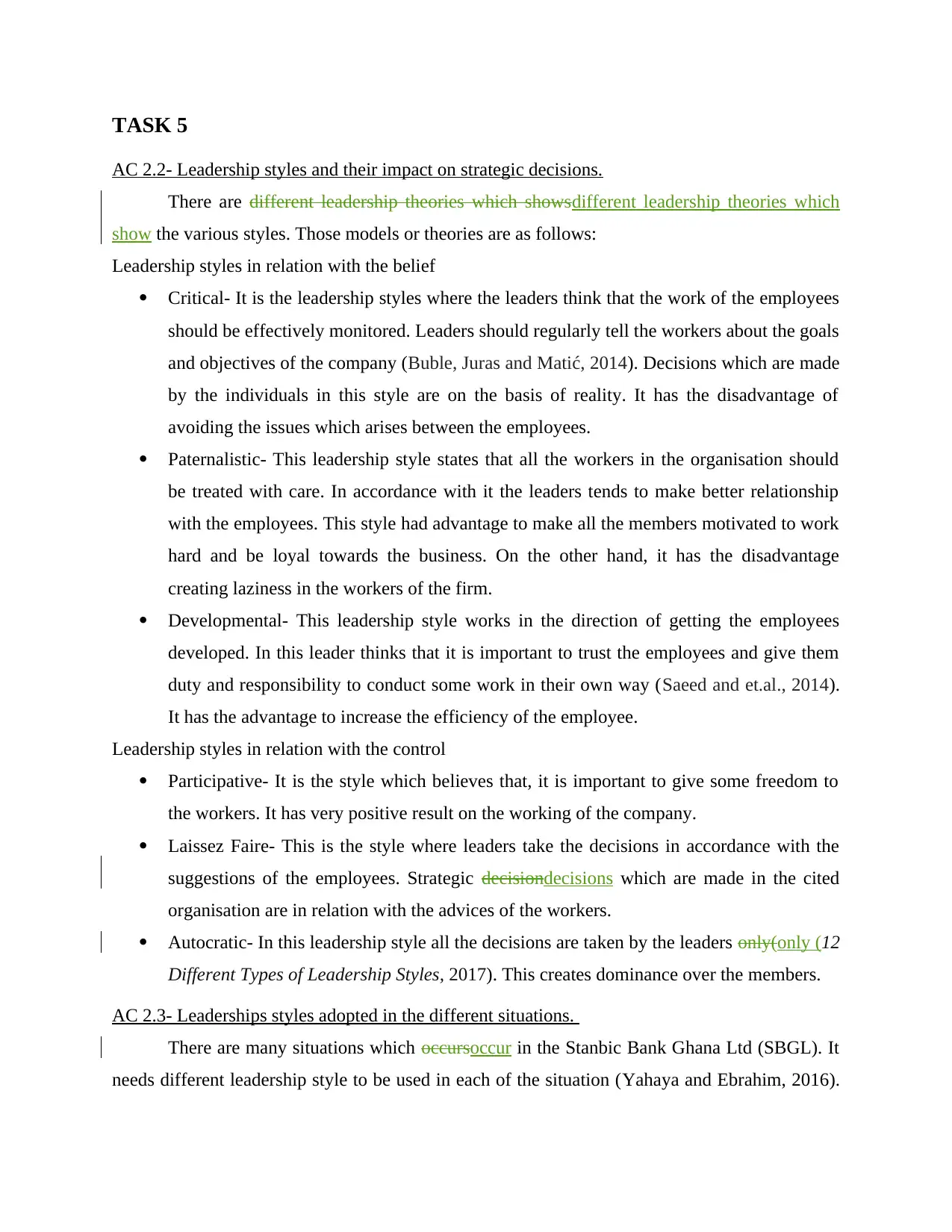
TASK 5
AC 2.2- Leadership styles and their impact on strategic decisions.
There are different leadership theories which showsdifferent leadership theories which
show the various styles. Those models or theories are as follows:
Leadership styles in relation with the belief
Critical- It is the leadership styles where the leaders think that the work of the employees
should be effectively monitored. Leaders should regularly tell the workers about the goals
and objectives of the company (Buble, Juras and Matić, 2014). Decisions which are made
by the individuals in this style are on the basis of reality. It has the disadvantage of
avoiding the issues which arises between the employees.
Paternalistic- This leadership style states that all the workers in the organisation should
be treated with care. In accordance with it the leaders tends to make better relationship
with the employees. This style had advantage to make all the members motivated to work
hard and be loyal towards the business. On the other hand, it has the disadvantage
creating laziness in the workers of the firm.
Developmental- This leadership style works in the direction of getting the employees
developed. In this leader thinks that it is important to trust the employees and give them
duty and responsibility to conduct some work in their own way (Saeed and et.al., 2014).
It has the advantage to increase the efficiency of the employee.
Leadership styles in relation with the control
Participative- It is the style which believes that, it is important to give some freedom to
the workers. It has very positive result on the working of the company.
Laissez Faire- This is the style where leaders take the decisions in accordance with the
suggestions of the employees. Strategic decisiondecisions which are made in the cited
organisation are in relation with the advices of the workers.
Autocratic- In this leadership style all the decisions are taken by the leaders only(only (12
Different Types of Leadership Styles, 2017). This creates dominance over the members.
AC 2.3- Leaderships styles adopted in the different situations.
There are many situations which occursoccur in the Stanbic Bank Ghana Ltd (SBGL). It
needs different leadership style to be used in each of the situation (Yahaya and Ebrahim, 2016).
AC 2.2- Leadership styles and their impact on strategic decisions.
There are different leadership theories which showsdifferent leadership theories which
show the various styles. Those models or theories are as follows:
Leadership styles in relation with the belief
Critical- It is the leadership styles where the leaders think that the work of the employees
should be effectively monitored. Leaders should regularly tell the workers about the goals
and objectives of the company (Buble, Juras and Matić, 2014). Decisions which are made
by the individuals in this style are on the basis of reality. It has the disadvantage of
avoiding the issues which arises between the employees.
Paternalistic- This leadership style states that all the workers in the organisation should
be treated with care. In accordance with it the leaders tends to make better relationship
with the employees. This style had advantage to make all the members motivated to work
hard and be loyal towards the business. On the other hand, it has the disadvantage
creating laziness in the workers of the firm.
Developmental- This leadership style works in the direction of getting the employees
developed. In this leader thinks that it is important to trust the employees and give them
duty and responsibility to conduct some work in their own way (Saeed and et.al., 2014).
It has the advantage to increase the efficiency of the employee.
Leadership styles in relation with the control
Participative- It is the style which believes that, it is important to give some freedom to
the workers. It has very positive result on the working of the company.
Laissez Faire- This is the style where leaders take the decisions in accordance with the
suggestions of the employees. Strategic decisiondecisions which are made in the cited
organisation are in relation with the advices of the workers.
Autocratic- In this leadership style all the decisions are taken by the leaders only(only (12
Different Types of Leadership Styles, 2017). This creates dominance over the members.
AC 2.3- Leaderships styles adopted in the different situations.
There are many situations which occursoccur in the Stanbic Bank Ghana Ltd (SBGL). It
needs different leadership style to be used in each of the situation (Yahaya and Ebrahim, 2016).
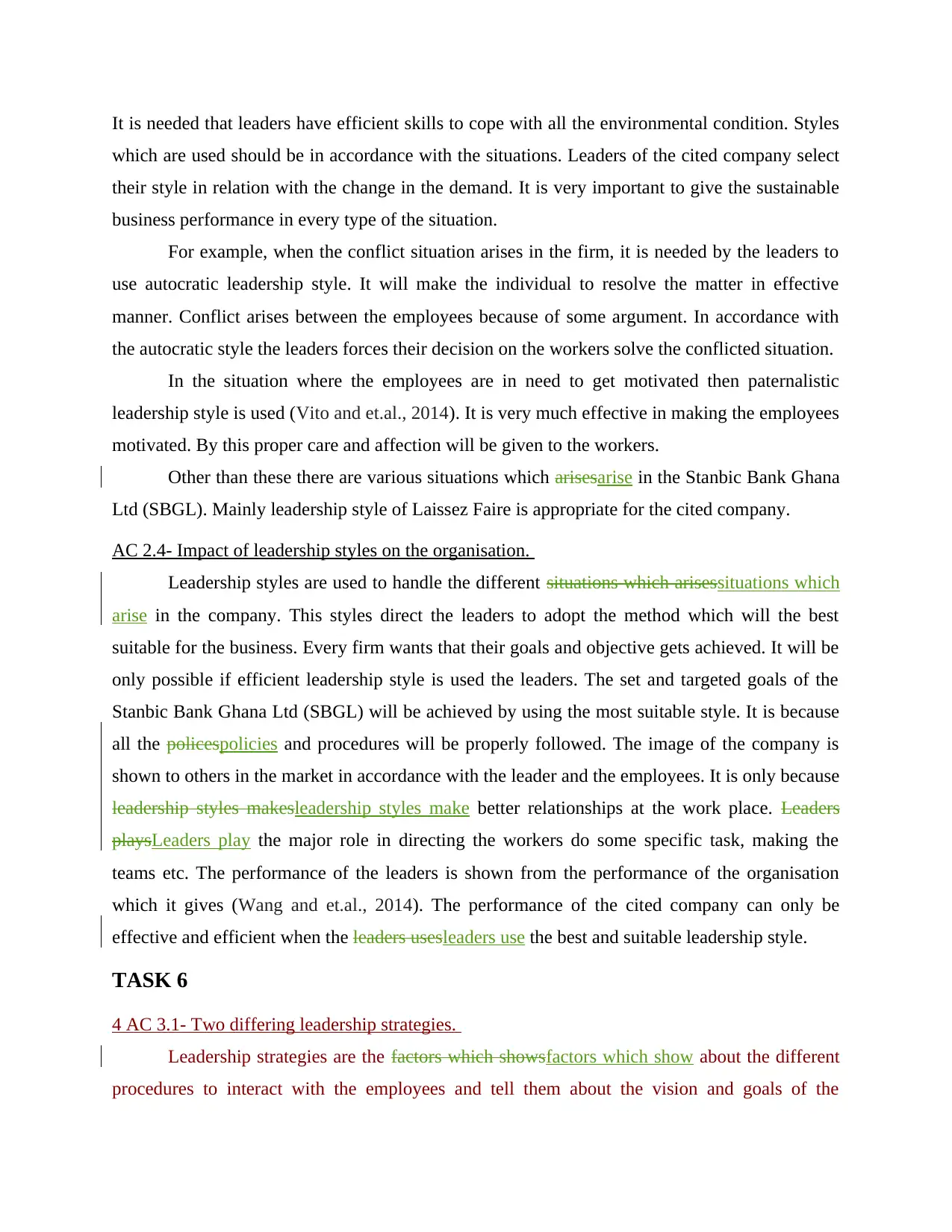
It is needed that leaders have efficient skills to cope with all the environmental condition. Styles
which are used should be in accordance with the situations. Leaders of the cited company select
their style in relation with the change in the demand. It is very important to give the sustainable
business performance in every type of the situation.
For example, when the conflict situation arises in the firm, it is needed by the leaders to
use autocratic leadership style. It will make the individual to resolve the matter in effective
manner. Conflict arises between the employees because of some argument. In accordance with
the autocratic style the leaders forces their decision on the workers solve the conflicted situation.
In the situation where the employees are in need to get motivated then paternalistic
leadership style is used (Vito and et.al., 2014). It is very much effective in making the employees
motivated. By this proper care and affection will be given to the workers.
Other than these there are various situations which arisesarise in the Stanbic Bank Ghana
Ltd (SBGL). Mainly leadership style of Laissez Faire is appropriate for the cited company.
AC 2.4- Impact of leadership styles on the organisation.
Leadership styles are used to handle the different situations which arisessituations which
arise in the company. This styles direct the leaders to adopt the method which will the best
suitable for the business. Every firm wants that their goals and objective gets achieved. It will be
only possible if efficient leadership style is used the leaders. The set and targeted goals of the
Stanbic Bank Ghana Ltd (SBGL) will be achieved by using the most suitable style. It is because
all the policespolicies and procedures will be properly followed. The image of the company is
shown to others in the market in accordance with the leader and the employees. It is only because
leadership styles makesleadership styles make better relationships at the work place. Leaders
playsLeaders play the major role in directing the workers do some specific task, making the
teams etc. The performance of the leaders is shown from the performance of the organisation
which it gives (Wang and et.al., 2014). The performance of the cited company can only be
effective and efficient when the leaders usesleaders use the best and suitable leadership style.
TASK 6
4 AC 3.1- Two differing leadership strategies.
Leadership strategies are the factors which showsfactors which show about the different
procedures to interact with the employees and tell them about the vision and goals of the
which are used should be in accordance with the situations. Leaders of the cited company select
their style in relation with the change in the demand. It is very important to give the sustainable
business performance in every type of the situation.
For example, when the conflict situation arises in the firm, it is needed by the leaders to
use autocratic leadership style. It will make the individual to resolve the matter in effective
manner. Conflict arises between the employees because of some argument. In accordance with
the autocratic style the leaders forces their decision on the workers solve the conflicted situation.
In the situation where the employees are in need to get motivated then paternalistic
leadership style is used (Vito and et.al., 2014). It is very much effective in making the employees
motivated. By this proper care and affection will be given to the workers.
Other than these there are various situations which arisesarise in the Stanbic Bank Ghana
Ltd (SBGL). Mainly leadership style of Laissez Faire is appropriate for the cited company.
AC 2.4- Impact of leadership styles on the organisation.
Leadership styles are used to handle the different situations which arisessituations which
arise in the company. This styles direct the leaders to adopt the method which will the best
suitable for the business. Every firm wants that their goals and objective gets achieved. It will be
only possible if efficient leadership style is used the leaders. The set and targeted goals of the
Stanbic Bank Ghana Ltd (SBGL) will be achieved by using the most suitable style. It is because
all the policespolicies and procedures will be properly followed. The image of the company is
shown to others in the market in accordance with the leader and the employees. It is only because
leadership styles makesleadership styles make better relationships at the work place. Leaders
playsLeaders play the major role in directing the workers do some specific task, making the
teams etc. The performance of the leaders is shown from the performance of the organisation
which it gives (Wang and et.al., 2014). The performance of the cited company can only be
effective and efficient when the leaders usesleaders use the best and suitable leadership style.
TASK 6
4 AC 3.1- Two differing leadership strategies.
Leadership strategies are the factors which showsfactors which show about the different
procedures to interact with the employees and tell them about the vision and goals of the
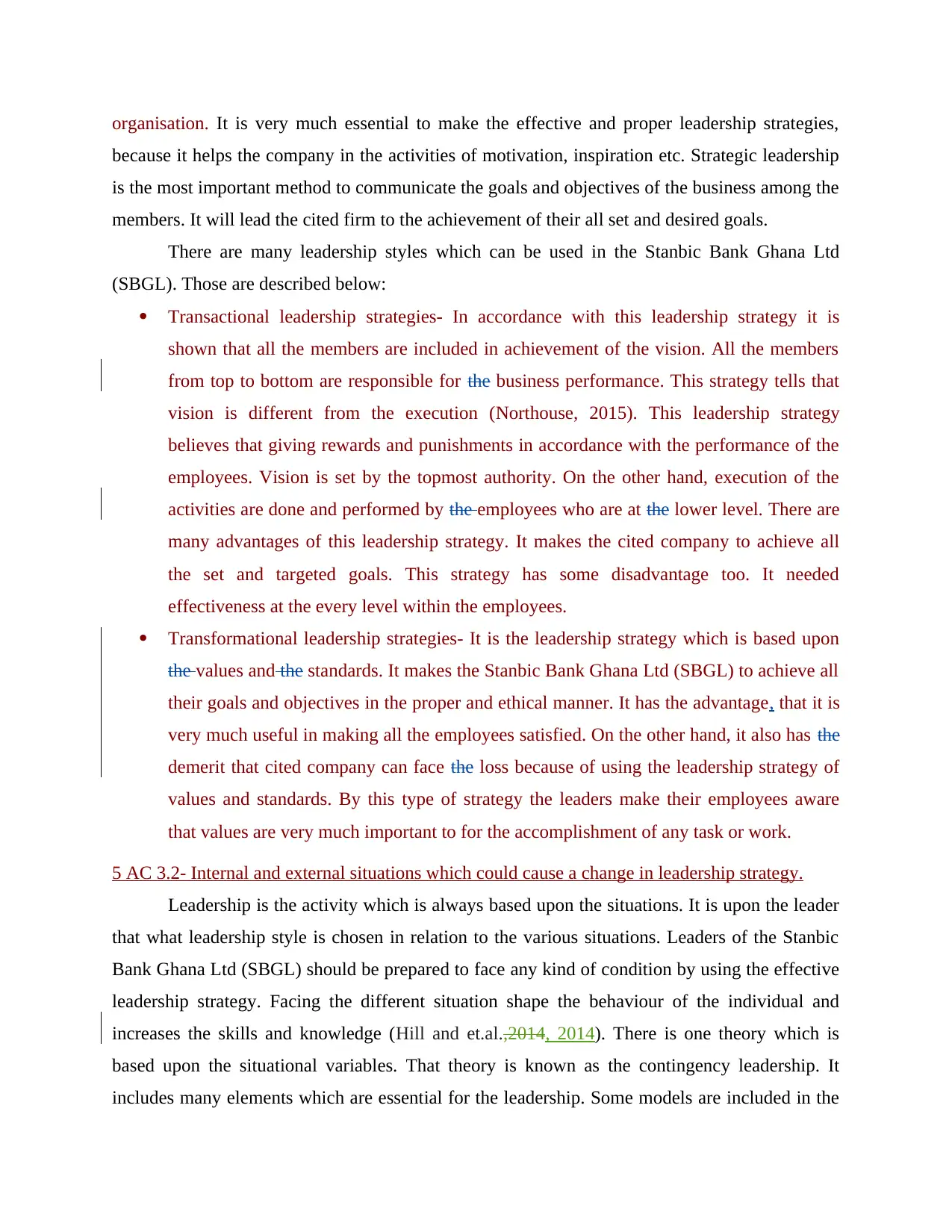
organisation. It is very much essential to make the effective and proper leadership strategies,
because it helps the company in the activities of motivation, inspiration etc. Strategic leadership
is the most important method to communicate the goals and objectives of the business among the
members. It will lead the cited firm to the achievement of their all set and desired goals.
There are many leadership styles which can be used in the Stanbic Bank Ghana Ltd
(SBGL). Those are described below:
Transactional leadership strategies- In accordance with this leadership strategy it is
shown that all the members are included in achievement of the vision. All the members
from top to bottom are responsible for the business performance. This strategy tells that
vision is different from the execution (Northouse, 2015). This leadership strategy
believes that giving rewards and punishments in accordance with the performance of the
employees. Vision is set by the topmost authority. On the other hand, execution of the
activities are done and performed by the employees who are at the lower level. There are
many advantages of this leadership strategy. It makes the cited company to achieve all
the set and targeted goals. This strategy has some disadvantage too. It needed
effectiveness at the every level within the employees.
Transformational leadership strategies- It is the leadership strategy which is based upon
the values and the standards. It makes the Stanbic Bank Ghana Ltd (SBGL) to achieve all
their goals and objectives in the proper and ethical manner. It has the advantage, that it is
very much useful in making all the employees satisfied. On the other hand, it also has the
demerit that cited company can face the loss because of using the leadership strategy of
values and standards. By this type of strategy the leaders make their employees aware
that values are very much important to for the accomplishment of any task or work.
5 AC 3.2- Internal and external situations which could cause a change in leadership strategy.
Leadership is the activity which is always based upon the situations. It is upon the leader
that what leadership style is chosen in relation to the various situations. Leaders of the Stanbic
Bank Ghana Ltd (SBGL) should be prepared to face any kind of condition by using the effective
leadership strategy. Facing the different situation shape the behaviour of the individual and
increases the skills and knowledge (Hill and et.al.,2014, 2014). There is one theory which is
based upon the situational variables. That theory is known as the contingency leadership. It
includes many elements which are essential for the leadership. Some models are included in the
because it helps the company in the activities of motivation, inspiration etc. Strategic leadership
is the most important method to communicate the goals and objectives of the business among the
members. It will lead the cited firm to the achievement of their all set and desired goals.
There are many leadership styles which can be used in the Stanbic Bank Ghana Ltd
(SBGL). Those are described below:
Transactional leadership strategies- In accordance with this leadership strategy it is
shown that all the members are included in achievement of the vision. All the members
from top to bottom are responsible for the business performance. This strategy tells that
vision is different from the execution (Northouse, 2015). This leadership strategy
believes that giving rewards and punishments in accordance with the performance of the
employees. Vision is set by the topmost authority. On the other hand, execution of the
activities are done and performed by the employees who are at the lower level. There are
many advantages of this leadership strategy. It makes the cited company to achieve all
the set and targeted goals. This strategy has some disadvantage too. It needed
effectiveness at the every level within the employees.
Transformational leadership strategies- It is the leadership strategy which is based upon
the values and the standards. It makes the Stanbic Bank Ghana Ltd (SBGL) to achieve all
their goals and objectives in the proper and ethical manner. It has the advantage, that it is
very much useful in making all the employees satisfied. On the other hand, it also has the
demerit that cited company can face the loss because of using the leadership strategy of
values and standards. By this type of strategy the leaders make their employees aware
that values are very much important to for the accomplishment of any task or work.
5 AC 3.2- Internal and external situations which could cause a change in leadership strategy.
Leadership is the activity which is always based upon the situations. It is upon the leader
that what leadership style is chosen in relation to the various situations. Leaders of the Stanbic
Bank Ghana Ltd (SBGL) should be prepared to face any kind of condition by using the effective
leadership strategy. Facing the different situation shape the behaviour of the individual and
increases the skills and knowledge (Hill and et.al.,2014, 2014). There is one theory which is
based upon the situational variables. That theory is known as the contingency leadership. It
includes many elements which are essential for the leadership. Some models are included in the
Secure Best Marks with AI Grader
Need help grading? Try our AI Grader for instant feedback on your assignments.
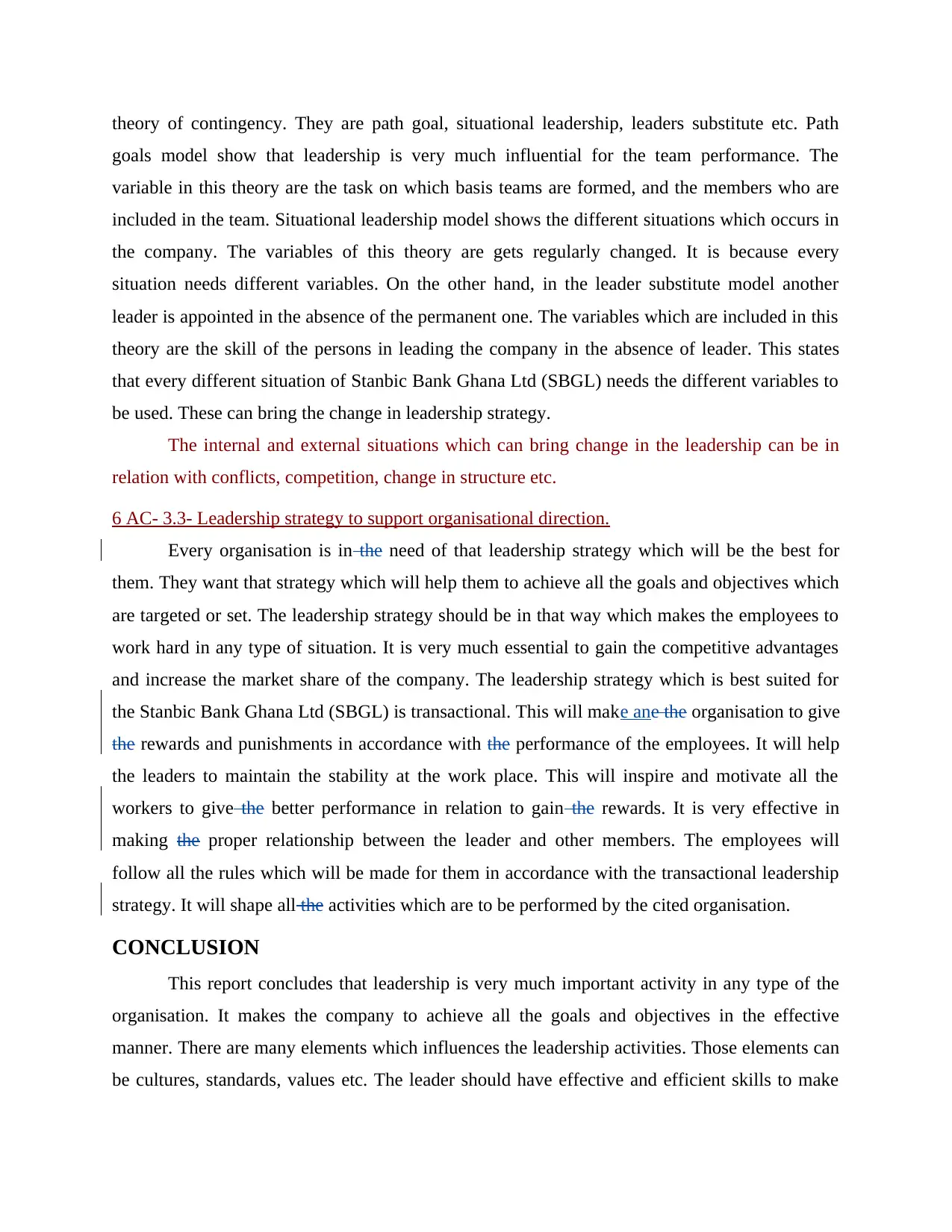
theory of contingency. They are path goal, situational leadership, leaders substitute etc. Path
goals model show that leadership is very much influential for the team performance. The
variable in this theory are the task on which basis teams are formed, and the members who are
included in the team. Situational leadership model shows the different situations which occurs in
the company. The variables of this theory are gets regularly changed. It is because every
situation needs different variables. On the other hand, in the leader substitute model another
leader is appointed in the absence of the permanent one. The variables which are included in this
theory are the skill of the persons in leading the company in the absence of leader. This states
that every different situation of Stanbic Bank Ghana Ltd (SBGL) needs the different variables to
be used. These can bring the change in leadership strategy.
The internal and external situations which can bring change in the leadership can be in
relation with conflicts, competition, change in structure etc.
6 AC- 3.3- Leadership strategy to support organisational direction.
Every organisation is in the need of that leadership strategy which will be the best for
them. They want that strategy which will help them to achieve all the goals and objectives which
are targeted or set. The leadership strategy should be in that way which makes the employees to
work hard in any type of situation. It is very much essential to gain the competitive advantages
and increase the market share of the company. The leadership strategy which is best suited for
the Stanbic Bank Ghana Ltd (SBGL) is transactional. This will make ane the organisation to give
the rewards and punishments in accordance with the performance of the employees. It will help
the leaders to maintain the stability at the work place. This will inspire and motivate all the
workers to give the better performance in relation to gain the rewards. It is very effective in
making the proper relationship between the leader and other members. The employees will
follow all the rules which will be made for them in accordance with the transactional leadership
strategy. It will shape all the activities which are to be performed by the cited organisation.
CONCLUSION
This report concludes that leadership is very much important activity in any type of the
organisation. It makes the company to achieve all the goals and objectives in the effective
manner. There are many elements which influences the leadership activities. Those elements can
be cultures, standards, values etc. The leader should have effective and efficient skills to make
goals model show that leadership is very much influential for the team performance. The
variable in this theory are the task on which basis teams are formed, and the members who are
included in the team. Situational leadership model shows the different situations which occurs in
the company. The variables of this theory are gets regularly changed. It is because every
situation needs different variables. On the other hand, in the leader substitute model another
leader is appointed in the absence of the permanent one. The variables which are included in this
theory are the skill of the persons in leading the company in the absence of leader. This states
that every different situation of Stanbic Bank Ghana Ltd (SBGL) needs the different variables to
be used. These can bring the change in leadership strategy.
The internal and external situations which can bring change in the leadership can be in
relation with conflicts, competition, change in structure etc.
6 AC- 3.3- Leadership strategy to support organisational direction.
Every organisation is in the need of that leadership strategy which will be the best for
them. They want that strategy which will help them to achieve all the goals and objectives which
are targeted or set. The leadership strategy should be in that way which makes the employees to
work hard in any type of situation. It is very much essential to gain the competitive advantages
and increase the market share of the company. The leadership strategy which is best suited for
the Stanbic Bank Ghana Ltd (SBGL) is transactional. This will make ane the organisation to give
the rewards and punishments in accordance with the performance of the employees. It will help
the leaders to maintain the stability at the work place. This will inspire and motivate all the
workers to give the better performance in relation to gain the rewards. It is very effective in
making the proper relationship between the leader and other members. The employees will
follow all the rules which will be made for them in accordance with the transactional leadership
strategy. It will shape all the activities which are to be performed by the cited organisation.
CONCLUSION
This report concludes that leadership is very much important activity in any type of the
organisation. It makes the company to achieve all the goals and objectives in the effective
manner. There are many elements which influences the leadership activities. Those elements can
be cultures, standards, values etc. The leader should have effective and efficient skills to make
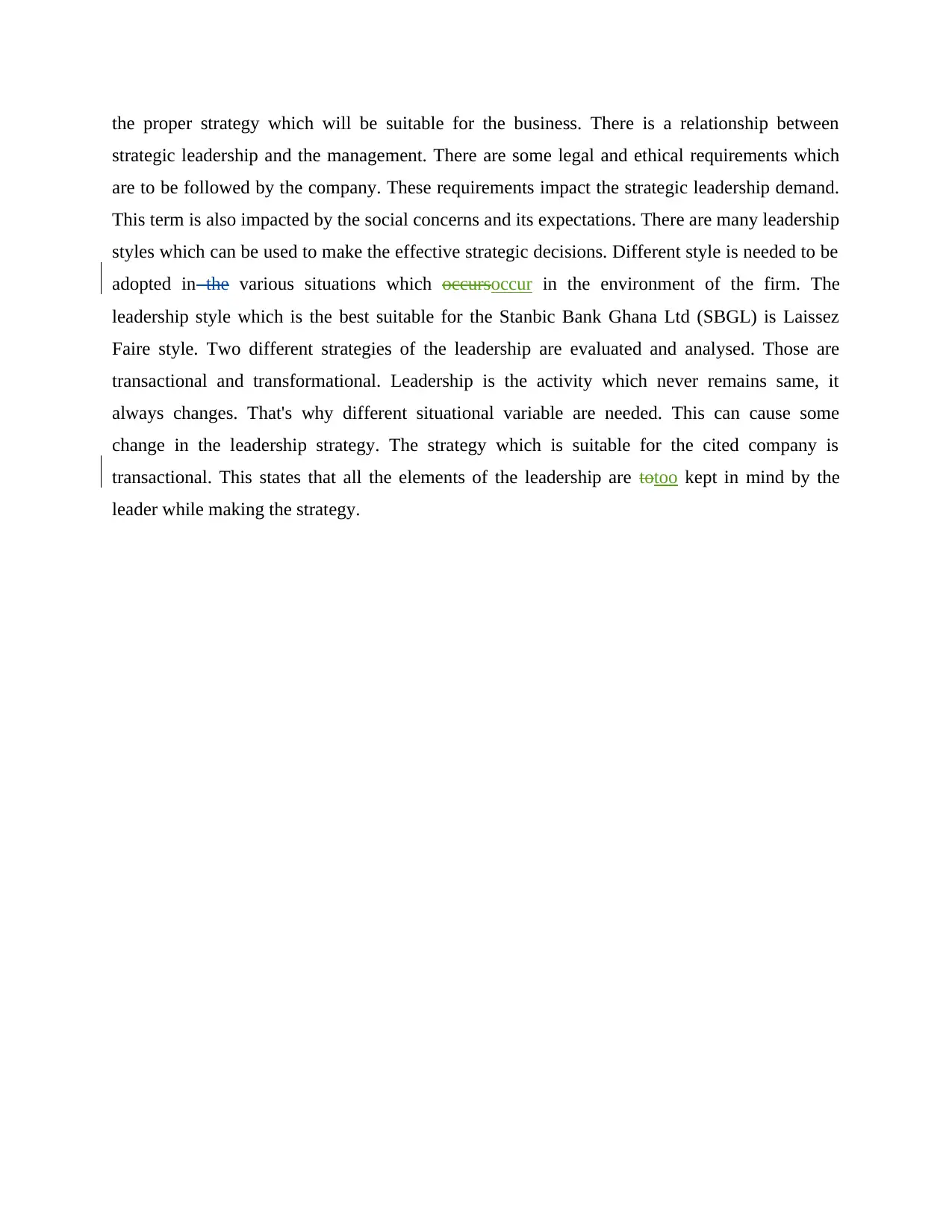
the proper strategy which will be suitable for the business. There is a relationship between
strategic leadership and the management. There are some legal and ethical requirements which
are to be followed by the company. These requirements impact the strategic leadership demand.
This term is also impacted by the social concerns and its expectations. There are many leadership
styles which can be used to make the effective strategic decisions. Different style is needed to be
adopted in the various situations which occursoccur in the environment of the firm. The
leadership style which is the best suitable for the Stanbic Bank Ghana Ltd (SBGL) is Laissez
Faire style. Two different strategies of the leadership are evaluated and analysed. Those are
transactional and transformational. Leadership is the activity which never remains same, it
always changes. That's why different situational variable are needed. This can cause some
change in the leadership strategy. The strategy which is suitable for the cited company is
transactional. This states that all the elements of the leadership are totoo kept in mind by the
leader while making the strategy.
strategic leadership and the management. There are some legal and ethical requirements which
are to be followed by the company. These requirements impact the strategic leadership demand.
This term is also impacted by the social concerns and its expectations. There are many leadership
styles which can be used to make the effective strategic decisions. Different style is needed to be
adopted in the various situations which occursoccur in the environment of the firm. The
leadership style which is the best suitable for the Stanbic Bank Ghana Ltd (SBGL) is Laissez
Faire style. Two different strategies of the leadership are evaluated and analysed. Those are
transactional and transformational. Leadership is the activity which never remains same, it
always changes. That's why different situational variable are needed. This can cause some
change in the leadership strategy. The strategy which is suitable for the cited company is
transactional. This states that all the elements of the leadership are totoo kept in mind by the
leader while making the strategy.
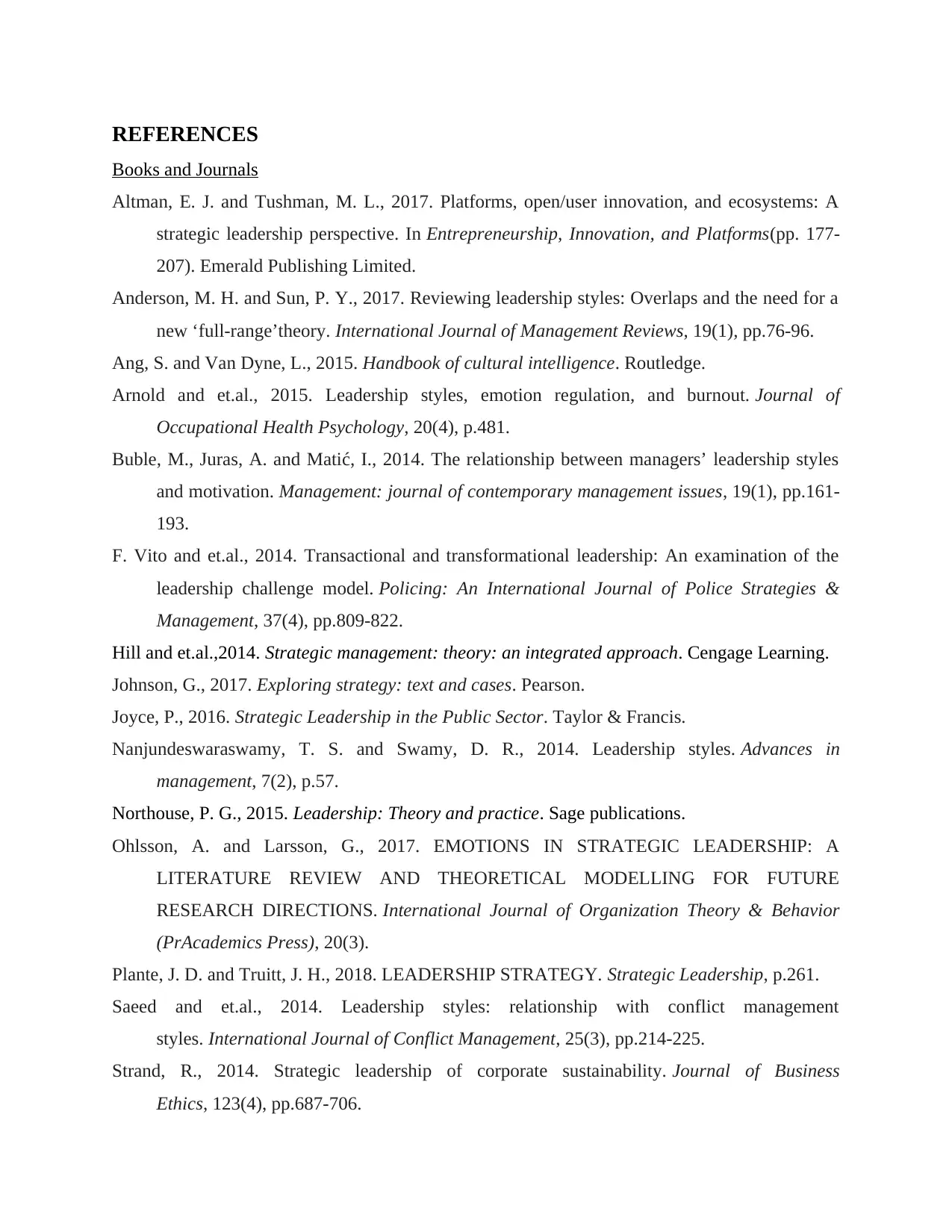
REFERENCES
Books and Journals
Altman, E. J. and Tushman, M. L., 2017. Platforms, open/user innovation, and ecosystems: A
strategic leadership perspective. In Entrepreneurship, Innovation, and Platforms(pp. 177-
207). Emerald Publishing Limited.
Anderson, M. H. and Sun, P. Y., 2017. Reviewing leadership styles: Overlaps and the need for a
new ‘full‐range’theory. International Journal of Management Reviews, 19(1), pp.76-96.
Ang, S. and Van Dyne, L., 2015. Handbook of cultural intelligence. Routledge.
Arnold and et.al., 2015. Leadership styles, emotion regulation, and burnout. Journal of
Occupational Health Psychology, 20(4), p.481.
Buble, M., Juras, A. and Matić, I., 2014. The relationship between managers’ leadership styles
and motivation. Management: journal of contemporary management issues, 19(1), pp.161-
193.
F. Vito and et.al., 2014. Transactional and transformational leadership: An examination of the
leadership challenge model. Policing: An International Journal of Police Strategies &
Management, 37(4), pp.809-822.
Hill and et.al.,2014. Strategic management: theory: an integrated approach. Cengage Learning.
Johnson, G., 2017. Exploring strategy: text and cases. Pearson.
Joyce, P., 2016. Strategic Leadership in the Public Sector. Taylor & Francis.
Nanjundeswaraswamy, T. S. and Swamy, D. R., 2014. Leadership styles. Advances in
management, 7(2), p.57.
Northouse, P. G., 2015. Leadership: Theory and practice. Sage publications.
Ohlsson, A. and Larsson, G., 2017. EMOTIONS IN STRATEGIC LEADERSHIP: A
LITERATURE REVIEW AND THEORETICAL MODELLING FOR FUTURE
RESEARCH DIRECTIONS. International Journal of Organization Theory & Behavior
(PrAcademics Press), 20(3).
Plante, J. D. and Truitt, J. H., 2018. LEADERSHIP STRATEGY. Strategic Leadership, p.261.
Saeed and et.al., 2014. Leadership styles: relationship with conflict management
styles. International Journal of Conflict Management, 25(3), pp.214-225.
Strand, R., 2014. Strategic leadership of corporate sustainability. Journal of Business
Ethics, 123(4), pp.687-706.
Books and Journals
Altman, E. J. and Tushman, M. L., 2017. Platforms, open/user innovation, and ecosystems: A
strategic leadership perspective. In Entrepreneurship, Innovation, and Platforms(pp. 177-
207). Emerald Publishing Limited.
Anderson, M. H. and Sun, P. Y., 2017. Reviewing leadership styles: Overlaps and the need for a
new ‘full‐range’theory. International Journal of Management Reviews, 19(1), pp.76-96.
Ang, S. and Van Dyne, L., 2015. Handbook of cultural intelligence. Routledge.
Arnold and et.al., 2015. Leadership styles, emotion regulation, and burnout. Journal of
Occupational Health Psychology, 20(4), p.481.
Buble, M., Juras, A. and Matić, I., 2014. The relationship between managers’ leadership styles
and motivation. Management: journal of contemporary management issues, 19(1), pp.161-
193.
F. Vito and et.al., 2014. Transactional and transformational leadership: An examination of the
leadership challenge model. Policing: An International Journal of Police Strategies &
Management, 37(4), pp.809-822.
Hill and et.al.,2014. Strategic management: theory: an integrated approach. Cengage Learning.
Johnson, G., 2017. Exploring strategy: text and cases. Pearson.
Joyce, P., 2016. Strategic Leadership in the Public Sector. Taylor & Francis.
Nanjundeswaraswamy, T. S. and Swamy, D. R., 2014. Leadership styles. Advances in
management, 7(2), p.57.
Northouse, P. G., 2015. Leadership: Theory and practice. Sage publications.
Ohlsson, A. and Larsson, G., 2017. EMOTIONS IN STRATEGIC LEADERSHIP: A
LITERATURE REVIEW AND THEORETICAL MODELLING FOR FUTURE
RESEARCH DIRECTIONS. International Journal of Organization Theory & Behavior
(PrAcademics Press), 20(3).
Plante, J. D. and Truitt, J. H., 2018. LEADERSHIP STRATEGY. Strategic Leadership, p.261.
Saeed and et.al., 2014. Leadership styles: relationship with conflict management
styles. International Journal of Conflict Management, 25(3), pp.214-225.
Strand, R., 2014. Strategic leadership of corporate sustainability. Journal of Business
Ethics, 123(4), pp.687-706.
Paraphrase This Document
Need a fresh take? Get an instant paraphrase of this document with our AI Paraphraser
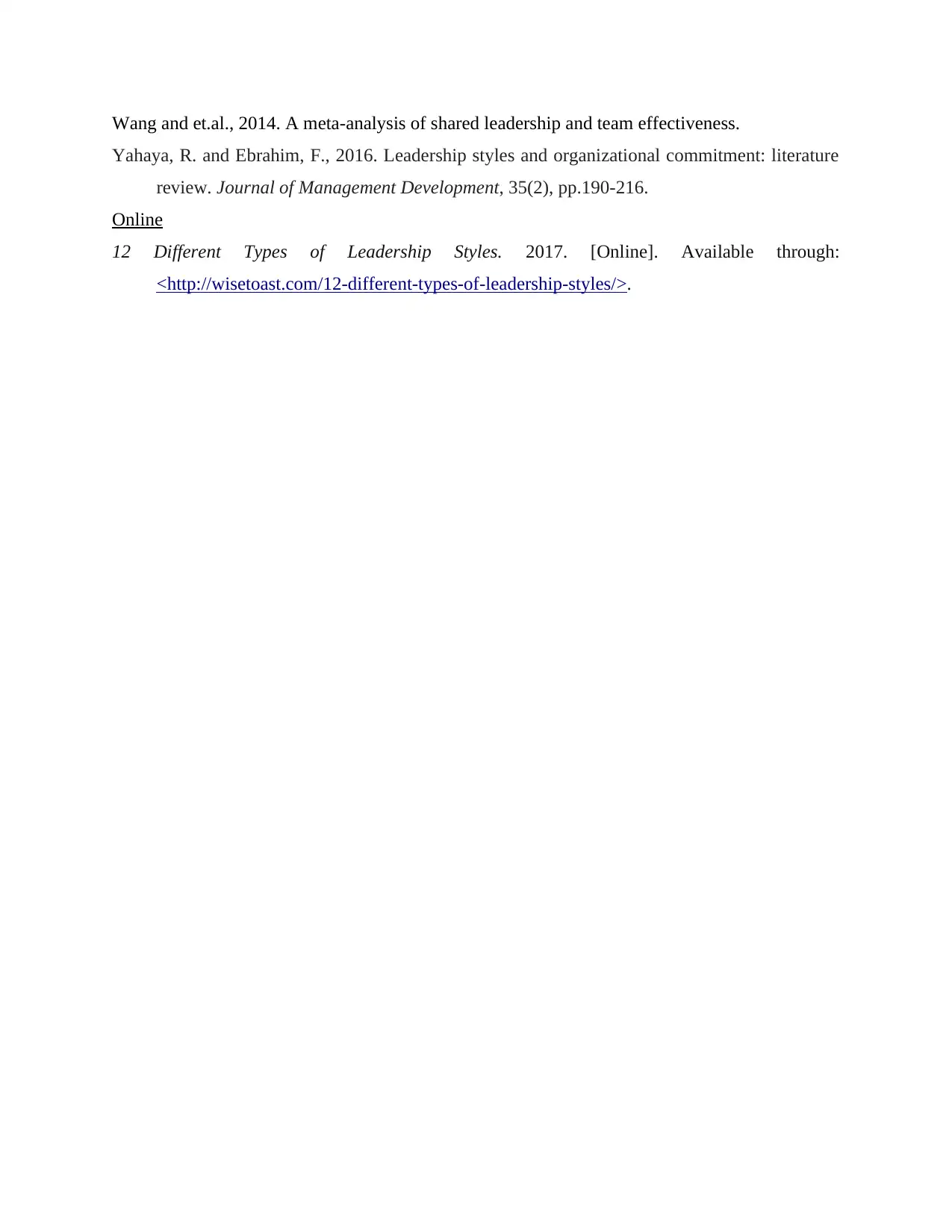
Wang and et.al., 2014. A meta-analysis of shared leadership and team effectiveness.
Yahaya, R. and Ebrahim, F., 2016. Leadership styles and organizational commitment: literature
review. Journal of Management Development, 35(2), pp.190-216.
Online
12 Different Types of Leadership Styles. 2017. [Online]. Available through:
<http://wisetoast.com/12-different-types-of-leadership-styles/>.
Yahaya, R. and Ebrahim, F., 2016. Leadership styles and organizational commitment: literature
review. Journal of Management Development, 35(2), pp.190-216.
Online
12 Different Types of Leadership Styles. 2017. [Online]. Available through:
<http://wisetoast.com/12-different-types-of-leadership-styles/>.

1 out of 15
Related Documents
Your All-in-One AI-Powered Toolkit for Academic Success.
+13062052269
info@desklib.com
Available 24*7 on WhatsApp / Email
![[object Object]](/_next/static/media/star-bottom.7253800d.svg)
Unlock your academic potential
© 2024 | Zucol Services PVT LTD | All rights reserved.





